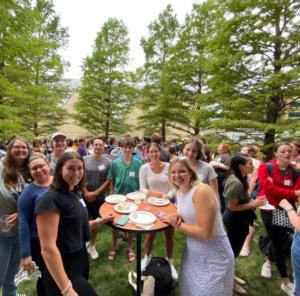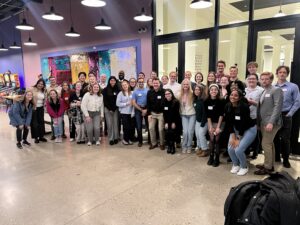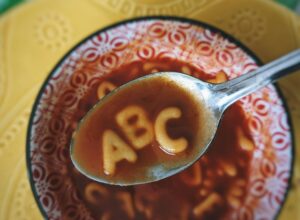The Students Behind the Marquette Law Mentorship Program
This is the fifth in a continuing series of weekly blog posts this semester about the work of Marquette Law School’s Office of Student Affairs. The opening post, like this one by Dean Joseph Kearney, can be found here; subsequent posts can be found here, here, and here.

Mentorship is a word that is heard a lot in the legal profession. Whatever else might be required for successful mentorship, it takes work to create an environment in which real relationships can form and appropriate counsel is offered and received.
Without doubting that there is much mentorship at the Law School, the Office of Student Affairs has assumed a particular portfolio in this sphere, with a good deal of the work being done by the student co-chairs of the Marquette Law Mentorship (MLM) Program. Under the leadership of Assistant Dean Anna Fodor, the office started the program in 2017, on the premise that if we should have a well-organized program, supported by the Office of Student Affairs and led each year by a pair of dedicated, skilled, and community-oriented upper-level students, the program would have a pretty good shot at succeeding.
So who better than this year’s MLM co-chairs, third-year students Isaiahs Luna and Courtney Tarnow, to describe the program and some of the behind-the-scenes work that goes into it? Here’s an interview of sorts, lightly edited, with Isaiahs and Courtney. Permit me as dean to extend my deep and sincere thanks to them—and to all of our past MLM co-chairs—for the time and work they have put into building, growing, and sustaining this important program at Marquette Law School.
In your words, what is the Marquette Law Mentorship Program?
Isaiahs: The Marquette Law Mentorship Program is a community-focused mission to foster professional and personal relationships within the Law School. The program allows upperclassmen and women to provide unique guidance that is personal to the first-year law student. The pairings are based on interests in the law, hometowns, and extracurricular activities, just to name a few factors.
Courtney: The Marquette Law Mentorship Program is an initiative designed to connect first-year law students with their upper-level peers to provide guidance, support, and camaraderie during their law school journey. Mentors offer insights, advice, and encouragement to their mentees, helping them adjust to the demands of law school and integrate into the greater law school community.
Overall, MLM aims to foster a sense of community and collaboration among law students, while also providing valuable peer support to allow first-year students to thrive both academically and personally during their time at Marquette.
Can you please describe your role as a co-chair of MLM?
Courtney: As an MLM co-chair, my role involves overseeing and coordinating various aspects of the mentorship program to ensure that the program is a success. Throughout the summer and fall semester, I worked closely with both my co-chair, Isaiahs, and Dean Fodor to advertise the program, train mentors, pair mentors and mentees, and schedule our Kick-Off Event.
Isaiahs: As co-chair of the Mentorship Program, there is a collaborative effort between you, your co-chair, and Dean Fodor. With Dean Fodor, we scheduled the Kick-Off Event and provided training for mentors. This was to ensure that mentors could provide the best guidance for first-year law students. We advised the mentors of the various resources that Marquette Law has available to students, and we had the potential mentors examine hypothetical situations a mentor might come across.
Of course, the most fun aspect of our role as co-chairs is to make the pairings. Courtney and I reserved a seminar room and, working from the forms that the students submitted, paired all the students who had signed up to participate in the program. It was a long process (around 12 hours), but we wanted to make sure everyone’s pairing was as perfect as it could be.
Community-building organizations must be energizing for you to enjoy the process and make them a success. Despite the long hours, we left that day even more excited for the program to get underway.
When matching mentors with mentees, what qualities or interests did you prioritize?
Isaiahs: Before anything else, I always checked if the mentor/mentee requested a certain characteristic or quality about their potential mentor/mentee in their form (for example, a 1L might request that their mentor be a person of color with a similar background). Next, I wanted to make sure out-of-staters were paired together (say, California mentors with California mentees) so they could begin to find a new community in Wisconsin right away. Then, I focused on the type of law the student was interested in. This was followed by taking into consideration any student organizations the first-year student wanted to be a part of.
Courtney: There were several qualities and interests that we prioritized while matching mentors and mentees to ensure there would be successful and meaningful connections. As Isaiahs mentioned, to start, we looked at the specific mentor and mentee requests. For example, some students requested not to be paired with someone specific because they already knew them well, or some students requested that their mentor be from out of state because they were also from out of state. After we paired up everyone who had made specific requests, we typically looked at interests such as area of law, student organizations, and other non-academic interests.
What was the hardest part about the matching process?
Courtney: The hardest part of the matching process was trying to balance and to work with the various information we had, to ensure everyone had the best match possible. In some instances, based on how much a student had provided, we had very little information to work with. That made it somewhat difficult to ensure that we were making a good pairing.
Isaiahs: I completely agree. The hardest part about the matching process really was the lack of diversity in some answers. To provide an example, there were many people who listed transactional law as the type of law they wanted to practice, but they did not provide any other information about their interests or background. So when all the transactional-law-interested mentees were paired up, we had a tough time pairing up transactional-law-interested mentors who had not provided additional information, beyond their interest in that practice. For students interested in participating in the future, we especially encourage them to share some further information about what makes them unique—from a random hobby to their major in college.
What do you hope mentees get out of MLM?
Isaiahs: At a minimum, a connection—whether professional or social. I think a connection is important to start law school. I continue to keep in contact with my mentor, who’s now graduated, and she continues to guide me throughout law school. More importantly, she has become a friend for life.
Courtney: The one thing I hope that every mentee gets out of their participation with MLM is a stronger sense of belonging and connection within the law school community. One of my favorite things about Marquette is that we have such a strong, collaborative community of students, faculty, staff, and alumni, and I hope that through MLM, mentees are able to feel like they truly belong here, right from the start.
What do you hope mentors get out of MLM?
Courtney: I hope that mentors will, first and foremost, experience personal satisfaction from their participation in MLM. Additionally, I think being a mentor is a great way to develop leadership and communication skills, expand your personal network, and contribute to enhancing the law school community.
How do you think the law school community, as a whole, benefits from the program?
Isaiahs: A sense of community. Given how interconnected the Milwaukee legal market is, it is important we establish a positive community from the first chance we have—and that starts at law school.
Courtney: The law school community as a whole benefits from MLM in a few significant ways. First, MLM cultivates a culture of support and collaboration within the Law School by facilitating relationships between students. Second, MLM promotes networking and relationship building. Mentors and mentees can develop meaningful connections beyond the mentorship relationship and allow for a network among current and future legal professionals. Third, MLM helps promote professional development for both mentors and mentees.
What has been your favorite part of serving as an MLM co-chair?
Courtney: My favorite part about serving as an MLM co-chair has been the successful matches. There is nothing that makes me happier than seeing mentors and mentees together at school, getting dinner together, going to bar review, etc.
Isaiahs: I have to agree with Courtney. It’s the successful matches. When people come up to me and say, “Hey, I really loved my [mentor/mentee],” it brings me so much joy.
Any parting thoughts as you prepare to graduate?
Isaiahs: I cannot thank Dean Fodor enough for her belief in me. I look back to my 1L year, and I look back with joy and awe at all the opportunities I have come across. And, truly, it starts with Dean Fodor. Her unwavering support throughout my time here will never be forgotten. I would not be where I am without her (I almost transferred back to California), and I only wish to give back to the Marquette Law community as much I received. I am grateful.
Courtney: As I prepare to graduate, I’ve reflected a lot on my time at Marquette, both for undergrad and law school. Marquette has provided me with so many amazing experiences, and I can’t thank Dean Fodor enough for giving me the opportunity to participate in MLM, as a mentee, mentor, and now as co-chair. This process was so challenging but also so rewarding, and I am grateful to have been a part of it.


